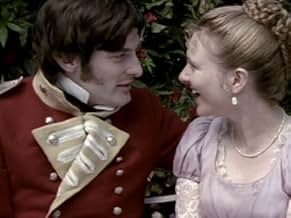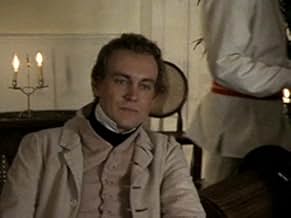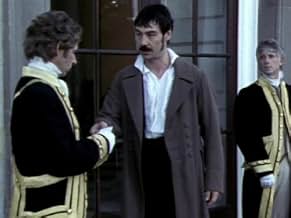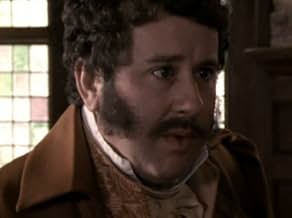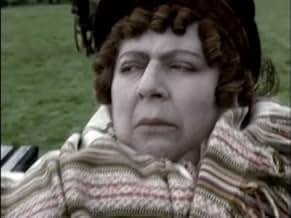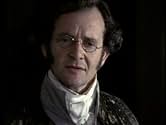IMDb RATING
7.7/10
1.8K
YOUR RATING
Becky Sharp's journey from obscurity to high society and subsequent fall is depicted against the backdrop of Regency England and the Napoleonic Wars.Becky Sharp's journey from obscurity to high society and subsequent fall is depicted against the backdrop of Regency England and the Napoleonic Wars.Becky Sharp's journey from obscurity to high society and subsequent fall is depicted against the backdrop of Regency England and the Napoleonic Wars.
- Nominated for 6 BAFTA Awards
- 5 wins & 9 nominations total
Browse episodes
Featured reviews
Generally I think that the great Victorian door-stoppers are better suited to the mini series format than that of feature films because even with a running time pushed to three hours there just isn't the room for the typical panorama of characters, supporting characters, plots and subplots. Even this production unavoidably leaves much out, but it captures the essence of Thackeray--cold eyed cynicism very occasionally softened by generosity. Nearly every element worked, right down to the snorting pig that appeared at the beginning of each new installment. I admit at first I was a bit disappointed by the choice of Natasha Little to play Rebecca because I thought the actress was too tall and elegant to play a character who was described as petite and vivacious. But no matter; Little's cool headedness, verbal wit, and carefully disguised ruthlessness were all pure Becky (unlike Mira Nair, the screenwriters of this production realized that to soften this character's harder edges wouldn't modernize her; rather, it would flatten her). Frances Grey does fine in in the thankless role of Amelia Sedley. Although this was somewhat out of keeping with the novel, I did like the scene of Amelia still in bed after her wedding night, her hair spread out on the pillow, blissfully talking to her new husband. It makes her seem a bit more than stupidly devoted child-woman she is for most of the novel and makes those later scenes in which Becky and George (just weeks after George's marriage) brazenly flirt in front of Amelia all the more painful. The other characters are well cast too, with the terrifying Lord Steyne being the most memorable of all--in his final scene, without having to say a word he looks as if he really will have Becky murdered without a second thought if she ever approaches him again.
All in all, highly recommended.
All in all, highly recommended.
You should read the review by PrimusM - it is an incredible read. I first saw this on television about ten years ago and immediately bought the videos. I have since bought the DVD and watched it again today. I had never read the novel (though I recall the name William Makepeace Thackeray from school), so I have no idea how accurate to the book this version is. However, previous reviewers seem to think it is as close as you can get. I love this mini-series so much. The somewhat dark humour and the love/hate for Becky is delicious. I love Natasha Little - first experiencing her acting abilities and beauty on 'This Life'. Strangely, the wonderfully grotesque nature of most of the characters reminds me of films like 'Strictly Ballroom' and 'Muriel's Wedding'. Odd I know, though they are also somewhat dark humoured films. Basically, this series is refreshingly un-Jane Austen like. Could you ever imagine 'Pride and Prejudice' opening with a large naked lady picking her nose while posing for a drunken painter whose young daughter is serving alcohol to his lecherous friends? Divine.
There has been a ridiculous number of movies about psychopathic killers - Silence of the Lambs, Se7en, Copycat, The Cell, etc, etc - and yet for a realistic depiction of a psychopath, this mini-series leaves them all far behind. If you want to see what the average psychopath is like (or perhaps I should say above average, because there is nothing average about Becky Sharp), this is far more true to life than all the others. The reality is that for every Hannibal Lecter in the world, there are a thousand Becky Sharps, and together they do far more damage than all the serial killers. I can only think that Thackeray must have known someone like her, because you can't get this close to reality by sheer imagination, and I don't know of any literary examples he could have copied from.
Of course, the novel, and the series, are about far more than one character - they are in fact about Vanity Fair, the world that Thackerary knew and didn't particularly love, the society which was so warped and hypocritical (rather like ours today, in fact) that it allowed characters like Becky Sharp to prosper.
This is not nearly as pleasant as the usual BBC mini-series, but it is compulsively watchable; the depiction is almost flawless and Natasha Little does a brilliant job portraying the woman we love to hate. The rest of the cast is also excellent, including Nathaniel Parker as Rawdon, the principal victim of his wife's intrigues, Philip Glenister as the lovable but awfully clumsy Dobbin and David Bradley as the appalling baronet Sir Pitt Crawley.
Of course, the novel, and the series, are about far more than one character - they are in fact about Vanity Fair, the world that Thackerary knew and didn't particularly love, the society which was so warped and hypocritical (rather like ours today, in fact) that it allowed characters like Becky Sharp to prosper.
This is not nearly as pleasant as the usual BBC mini-series, but it is compulsively watchable; the depiction is almost flawless and Natasha Little does a brilliant job portraying the woman we love to hate. The rest of the cast is also excellent, including Nathaniel Parker as Rawdon, the principal victim of his wife's intrigues, Philip Glenister as the lovable but awfully clumsy Dobbin and David Bradley as the appalling baronet Sir Pitt Crawley.
8=G=
A six hour miniseries by the BBC and A&E, "Vanity Fair" (1998) has sufficient time to present the classic tale of the socially adroit, cunning, and beguiling Becky Sharp's rise from lowly governess to lofty aristocrat with depth, detail, and attention to the many characters and side stories swirling around her. Given it's British pedigree, the film recreates the period with fidelity from beautiful country vistas to dank squalor; from stately manors to Gothic mansions; from handsome gentlemen to grotesque lechers; from elegant gowns to threadbare cloaks; etc. Natasha Little makes a superb centerpiece though her fellow actors are equally well cast and competent in their roles. The downside to the series is a somewhat uneven screenplay which spends time while women sing parlor songs only to rush through some of the moments in which we would most like to linger. The musical score is annoyingly heavy handed, poorly nuanced, and often too much like a poor Salvation Army brass street ensemble. "Vanity Fair" (1998) should be time well spent for anyone into Victorian period fare, especially comedy/dramas, the works of W.M. Thackeray, or fans of the players. Subtitling is excellent. (B+)
Thackeray prefaced his book with a short piece apparently explaining that the characters were just "puppets" who lived, ate and made love in a (fictional?) world that was neither moral nor immoral. Some have taken this at face value. However the book is generally seen as a savage satire and even today the appearance of Knight of the Realm, Sir Pitt Crawley, is rather shocking in that the reader just as much as the characters in the book, mistake him for a footman or even watchman such are his appearance and manners - breaking a convention that other Victorian writers such as Dickens and Trollope strictly observed. In the opening chapter the exceedingly disrespectful young Becky Sharp is again a character set against the Victorian archetype. Neither virtuous nor fallen woman (generally the literary alternatives at the time), Becky Sharp fights her way through life using her sharpness of perception and her bodily attractions - sometimes winning, sometimes losing badly.
Thackeray portrays a world where people can and do behave badly and act grossly. They are though not puppets - satire is not the portrayal of puppets, rather a clear-sighted, uncharitable and somewhat exaggerated version of reality. Thackeray is writing without rosy spectacles. The virtuous do not necessarily live happily ever after and the bad go unpunished. The weak, it seems, go to the wall. His preface then should be seen as a disingenuous disclaimer to quiet and fob off those who took exception to the sourness of his portrayal of humanity. But the book stands on its own two feet. The real Becky Sharp, on the make and none too scrupulous, existed then, she exists today, as do all the other characters but it requires the removal of the rose-tinted spectacles to see them - and perhaps some courage to write about them too.
This production plays the story entirely straight - an excellent cast portraying their characters realistically and without exaggeration, living according to their respective values and the hand Life deals them. It is left to the titles - the visuals and the music - to sound a ripe raspberry at their antics - and to remind us that this is not a puppet show but a sharp satire on how some people lived in England 200 years ago.
A pretty fine cast, not all though got an opportunity to shine, but memorable were Jeremy Swift as a perspiring great dumpling Jos Sedley; an unsmiling, uncharming and unsightly Lord Steyne, removing the noble from the nobility; Philip Glennister as the ever reliable Dobbin; Nathaniel Parker as the dashing officer/adventurer snared by adventuress, Becky Sharp. The problem however I had with Natasha Little was that she was no seductress, there was no sweetness (however false) that surely would have been an essential weapon in her fight to get what she wanted? Perhaps the book does not make clear the nature of her appeal to men, only her will, her lack of scruples and the mixed success she had. Was she too sharp to successfully mask it with sweetness? Was her practical, cool matter-of-factness attractive? Perhaps for all his sharp observation, Thackeray did not have intimate knowledge of such aggressively ambitious women?
Nobody mentions adapter Andrew Davies? Probably because he has done his job so well that nobody notices.
I rather doubt there will be a better version.
Thackeray portrays a world where people can and do behave badly and act grossly. They are though not puppets - satire is not the portrayal of puppets, rather a clear-sighted, uncharitable and somewhat exaggerated version of reality. Thackeray is writing without rosy spectacles. The virtuous do not necessarily live happily ever after and the bad go unpunished. The weak, it seems, go to the wall. His preface then should be seen as a disingenuous disclaimer to quiet and fob off those who took exception to the sourness of his portrayal of humanity. But the book stands on its own two feet. The real Becky Sharp, on the make and none too scrupulous, existed then, she exists today, as do all the other characters but it requires the removal of the rose-tinted spectacles to see them - and perhaps some courage to write about them too.
This production plays the story entirely straight - an excellent cast portraying their characters realistically and without exaggeration, living according to their respective values and the hand Life deals them. It is left to the titles - the visuals and the music - to sound a ripe raspberry at their antics - and to remind us that this is not a puppet show but a sharp satire on how some people lived in England 200 years ago.
A pretty fine cast, not all though got an opportunity to shine, but memorable were Jeremy Swift as a perspiring great dumpling Jos Sedley; an unsmiling, uncharming and unsightly Lord Steyne, removing the noble from the nobility; Philip Glennister as the ever reliable Dobbin; Nathaniel Parker as the dashing officer/adventurer snared by adventuress, Becky Sharp. The problem however I had with Natasha Little was that she was no seductress, there was no sweetness (however false) that surely would have been an essential weapon in her fight to get what she wanted? Perhaps the book does not make clear the nature of her appeal to men, only her will, her lack of scruples and the mixed success she had. Was she too sharp to successfully mask it with sweetness? Was her practical, cool matter-of-factness attractive? Perhaps for all his sharp observation, Thackeray did not have intimate knowledge of such aggressively ambitious women?
Nobody mentions adapter Andrew Davies? Probably because he has done his job so well that nobody notices.
I rather doubt there will be a better version.
Did you know
- TriviaThe mauve striped day dress worn by one of Miss Crawley's maids in the Park Lane street is the same costume worn by Anna Massey (Mrs. Norris) in Mansfield Park (1983).
- Quotes
Becky Sharp: I'm afraid I will have to charge you rather a lot. My horses are all I own in the world, you know.
Joss Sedley: Money is no object to me, ma'am.
Becky Sharp: That's good. Six hundred pounds.
[Jos is taken aback, but promptly reaches for his pocketbook.]
Becky Sharp: Each.
- ConnectionsFeatured in Screenwipe: Episode #2.3 (2006)
- SoundtracksSavez-vous Planter Les Chous?
Traditional
- How many seasons does Vanity Fair have?Powered by Alexa
Details
Contribute to this page
Suggest an edit or add missing content


